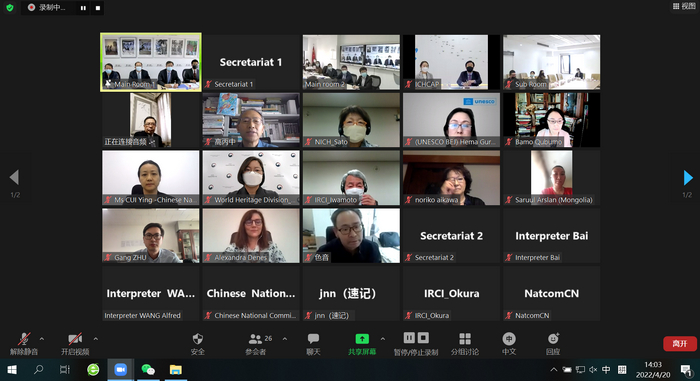CRIHAP's governing board holds 11th session

The 11th session of the governing board of the International Training Centre for Intangible Cultural Heritage in the Asia-Pacific region under the auspices of UNESCO was held on April 20, 2022 both online and offline.
Zhang Xu, chair of the board, vice-minister of the Ministry of Culture and Tourism of the People’s Republic of China, attended and chaired the session. Wang Chenyang, director-general of the ministry’s Department of Intangible Cultural Heritage, also attended. Among more than 50 other participants are board members and representatives from the ministry, the UNESCO Beijing Office, the International Research Centre for Intangible Cultural Heritage in the Asia-Pacific Region, and the International Information and Networking Centre for Intangible Cultural Heritage in the Asia-Pacific Region, as well as the chairperson and members of CRIHAP’s advisory committee and ICH safeguarding experts and scholars.
The work report and financial statement for fiscal year 2021, the work plan and budget for fiscal year 2022 and the medium-term Development Program for 2022-2026 were examined and adopted by the board at the session.
CRIHAP is a Category 2 UNESCO center which was established in 2012 in Beijing according to an agreement signed by the Chinese government and UNESCO. Deeply involved in the implementation of UNESCO's global capacity-building strategy of safeguarding intangible cultural heritage since its inception 10 years ago, CRIHAP has so far organized 60 intangible cultural heritage capacity-building workshops benefiting 41 countries and regions and more than 2,100 trainees.
Countries, organizations and personnel involved have shown a growing enthusiasm for learning about international exchange and cooperation under the framework of the 2003 convention and their ability to utilize the mechanism to advance ICH safeguarding work in the region has been improving significantly.
As stated in the 2021 internal oversight service evaluation of UNESCO’s actions in the framework of the 2003 convention, CRIHAP has contributed to the “noteworthy expansion of UNESCO’s capacity-building program in the field of ICH safeguarding, which is an important result at a time when UNESCO’s own resources for the delivery of capacity-building have been shrinking”.
Since the pandemic broke out worldwide, offline transnational training workshops have been put on hold while online training has been impacted by uncertainties due to epidemic control measures in different regions. As adjustments of mechanisms related to the 2003 convention are still underway, how to develop training themes and content pursuant to UNESCO’s latest strategies has become a key subject for CRIHAP to cope with. As ICH safeguarding in countries of the Asia-Pacific region widely differs from place to place, it has become a pressing issue for CRIHAP to design more diverse and country-specific training courses.
To meet these challenges, CRIHAP will pay more attention to course development and explore more effective ways to carry out online training, adhering to a results-oriented principle and solving problems in the process of development. At the same time, CRIHAP will closely follow and monitor the latest developments in UNESCO’s ICH safeguarding policies and measures, especially ICH capacity-building strategies, so as to achieve better performance in its future training.
Over the past year, CRIHAP has held eight international training workshops for 27 countries in the four sub-regions of East Asia, Southeast Asia, South Asia and the Pacific. All workshops ran in accordance with UNESCO’s key tasks and priorities under the framework of the 2003 convention, covering topics such as joint nomination, youth and ICH, ICH and education, ICH and sustainable development, and the “training of trainers”.

Address: 81, Laiguangying West Road, Chaoyang District, Beijing, China
Zip Code: 100021
Tel: 86-10-64966526
Fax: 86-10-64969281
E-mail: crihap@crihap.cn
Leave us your e-mail address, we'll let you know about current events.



